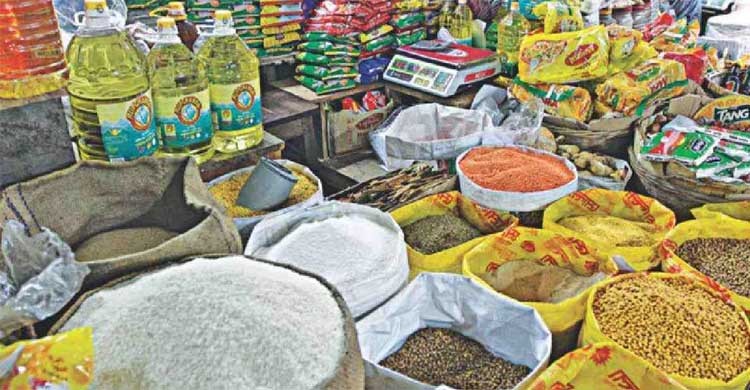Commerce, Home ministries coordinating govt's tough stance on price gouging ahead of Ramadan
20 March 2023, 03:27 pm | Updated: 19 April 2025, 09:07 am

This year's Ramadan is still a couple of days away, but a segment of traders already appears eager to increase profit margins by raising the prices of different commodities.
The government of Bangladesh however claims to be on to them, and has taken various initiatives to keep the market stable during the holy month, reports UNB.
Prime Minister Sheikh Hasina has directed officials to increase surveillance across the country so that dishonest businessmen cannot make excessive profits. She particularly instructed the field-level administration to be on alert. The Commerce Ministry has said it will keep an eye on the traders so they cannot destabilize the market by creating any artificial crisis.
Even detectives from the law enforcement agencies under the Home Ministry have been instructed to keep their eyes open so that unscrupulous syndicates do not create an artificial crisis in Ramadan.
In the past, it was noticed that traders increased the prices of goods several times before the start of market supervision ahead of Ramadan. Just before Ramadan, the demand for items like edible oil, sugar, pulses, chickpeas, spices, and so on increases. Traders take this opportunity and raise the prices of in-demand items. It is no different this time.
“Ramadan is a few days away. Like last year, I have bought sugar, pulses, and chickpeas at a much higher price. Every year the same thing happens. There is also an upswing in the vegetable market,” Wahid Fakir, a resident of Bhatara New Market, told UNB.
The prices of sugar, oil, ginger, onion, and other essential goods have all increased in the last week. Vegetables, fish, and meat prices are also going up. Although there is also no shortage of edible oil in the market, daily essentials are selling at an increased price rate every week.
"This year we are already on alert from before. No one will be spared, if there is an artificial crisis in the market. We, the local administration, including the law enforcement agencies, and consumer rights protection directorate, will continue to monitor the market with mobile courts,” Commerce Minister Tipu Munshi told UNB.
“As preparation for Ramadan, I have had meetings with businessmen one to two months ago. That's when we asked them to increase imports. In particular, instructions have been given so that the banks open the LCs quickly for the import of food products,” he said.
“The government has taken all kinds of necessary initiatives to keep the prices of goods under control during Ramadan. We have warned the traders about the preparations in advance this year. Controlling commodity prices was a challenging affair at this time of global crisis and rise in dollar rate,” he also said.
“Despite this, dollars have been provided for import of all food products commonly used in Ramadan. Besides, the ministry has requested the NBR to reduce the duty and VAT to reduce the prices of commodities like sugar and edible oil,” said the minister. “In addition, we are taking several other programmes to control the prices of goods during Ramadan. Apart from the family card allocated for 1 crore families, sugar and chickpeas will be sold in truck-sales in Dhaka and divisional cities. NBR has also extended the time for import of rice by three more months."
“Hopefully, the prices of goods will be stable during Ramadan. The government's preparation in this regard is good enough,” added Tipu Munshi.
Asked about the role of law enforcement agencies in keeping the market stable during Ramadan, Home Minister Asaduzzaman Khan said, "The law enforcement agencies have been instructed to prevent the rise in the prices of goods.”
“Detectives have already been instructed to keep an eye so that unscrupulous syndicates do not create any artificial crisis around Ramadan and make the market unstable. Several strict steps have been taken, including conducting mobile courts, to control the prices of consumer goods by suppressing syndicates,” he said.
“Various strategies are being formulated to prevent artificial crises in the market and to take action against those who stockpile goods. Along with the police, the law enforcement agencies and consumer rights department, including RAB, will be active in the field, the intelligence surveillance will also be increased,” he also said.
Cabinet Secretary Mahbub Hossain said, “If there is an abnormal situation in the market, we can enforce the law. Every deputy commissioner has been told about this. They will monitor it very strictly. We will also monitor from here.”






















